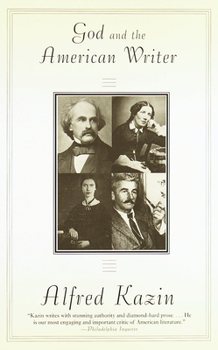God and the American Writer
Select Format
Select Condition 
Book Overview
God and the American Writer does more to illuminate the fundamental purposes and motivations of our greatest writers from Hawthorne to Faulkner than any study I have read in the past fifty-five years--that is, since the same author's On Native Grounds. --Louis S. Auchincloss This is the culminating work of the finest living critic of American literature. Alfred Kazin brings a lifetime of thought and reading to the triumphant elucidation of his fascinating...
Format:Paperback
Language:English
ISBN:0679733418
ISBN13:9780679733416
Release Date:October 1998
Publisher:Knopf Publishing Group
Length:288 Pages
Weight:0.55 lbs.
Dimensions:0.7" x 5.2" x 8.0"
Customer Reviews
1 rating
Religions of Freedom
Published by Thriftbooks.com User , 22 years ago
The famous American critic, Alfred Kazin, explores in this book various ideas of God and religion in the works of major American writers. The book is not limited to novelists but includes considerations of poets, essayists, philosophers, and Presidents as well. The book begins with the Puritan period of Jonathan Edwards and Anne Bradstreet and concludes with a glance at Thomas Pynchon and John Updike. There are chapters on Hawthorne, Harriet Beecher Stowe, Melville Whitman, Lincoln, Dickinson, William James, Mark Twain, T.S. Elliot, Frost, and Faulkner.Although the book describes many American approaches to religion, it is not until near its end that Kazin offers something of a definition of what he thinks the search is about. Kazin writes (p. 236) "I think of religion as the most intimate expression of the human heart, as the most secret of personal confessions, where we admit to ourselves alone our fears and our losses, our sense of holy dread and our awe before the unflagging power of a universe that regards us as indeed of 'no account'". It is not surprising, given both the nature of his subject matter and Kazin's own understanding of it, that the book invites us to see religion in personal, noninstitutional terms. We are also warned away (see p. 141) from an "American Civil Religion" in which Americans worship their own culture and history as evidenced by a smug materialism.There is a great emphasis in the book, as there should be, on slavery, the Civil War and continuing issues of race in America. Here Kazin gives Abraham Lincoln the strongest word, as a leader, a writer, and a religious thinker. Lincoln was a nonchurchgoer and was not religious in any traditional sense. He indeed exemplified a theme that appears to run through this book -- that in the United States people are encouraged to find religion and meaning for themselves outside the bounds of formal creed. Yet, in the Second Inaugural Address, Lincoln gave us a profound meditiation both on Divine Justice and on Divine Inscrutability and on the related, even though conflicting, themes of retribution and forgiveness.Most of the book covers familar authors and familiar books. I enjoyed in particular reading Kazin's discussion of Melville because it focuses on Melville's little-known epic poem Clarel. This poem is based on Melville's own trip to what was then Palestine and it explores Melville's tortured thought on the relationship between religion and secularism.This book is a valuable study both of American literature and American religious thought with an emphasis on the effect of freedom and secularism on the nature of religion in the United States. It may encourage the reader to explore, or to think about anew, the nature of American literature and to rethink for him or herself the nature of religious ideals and practices.






